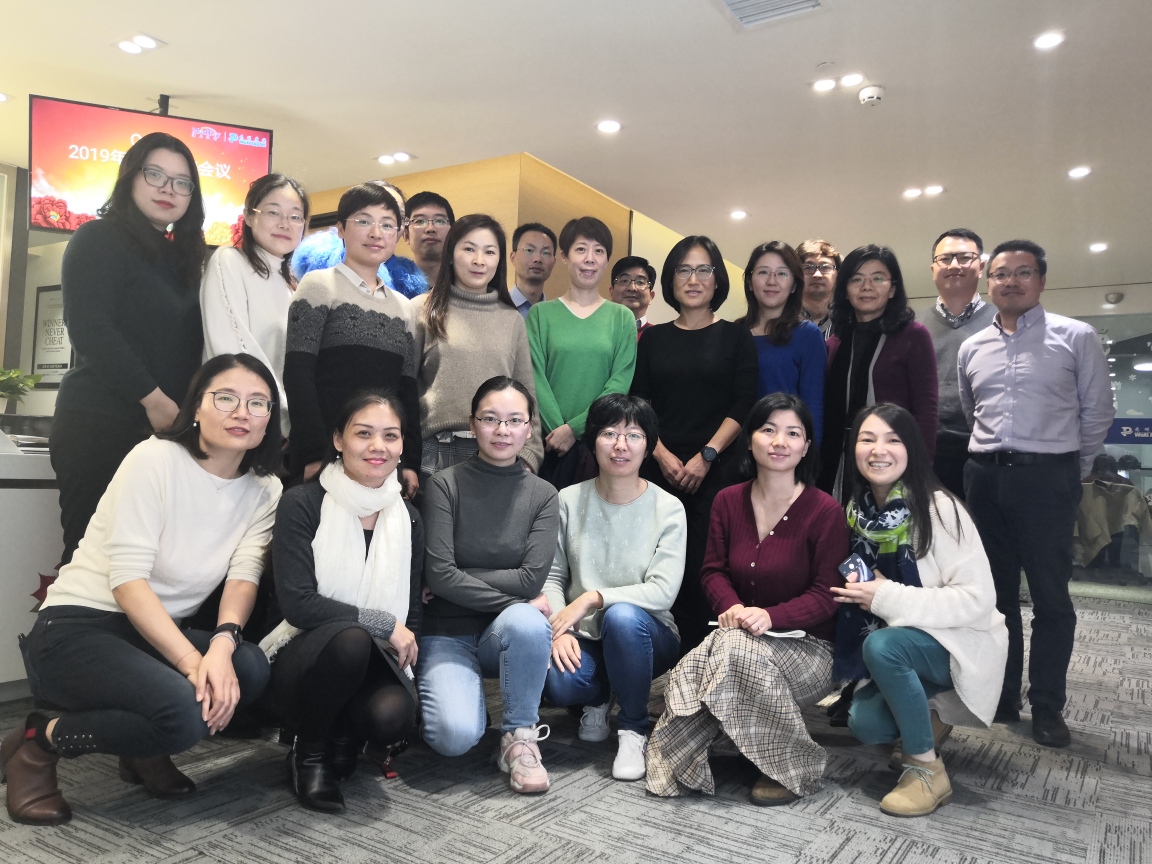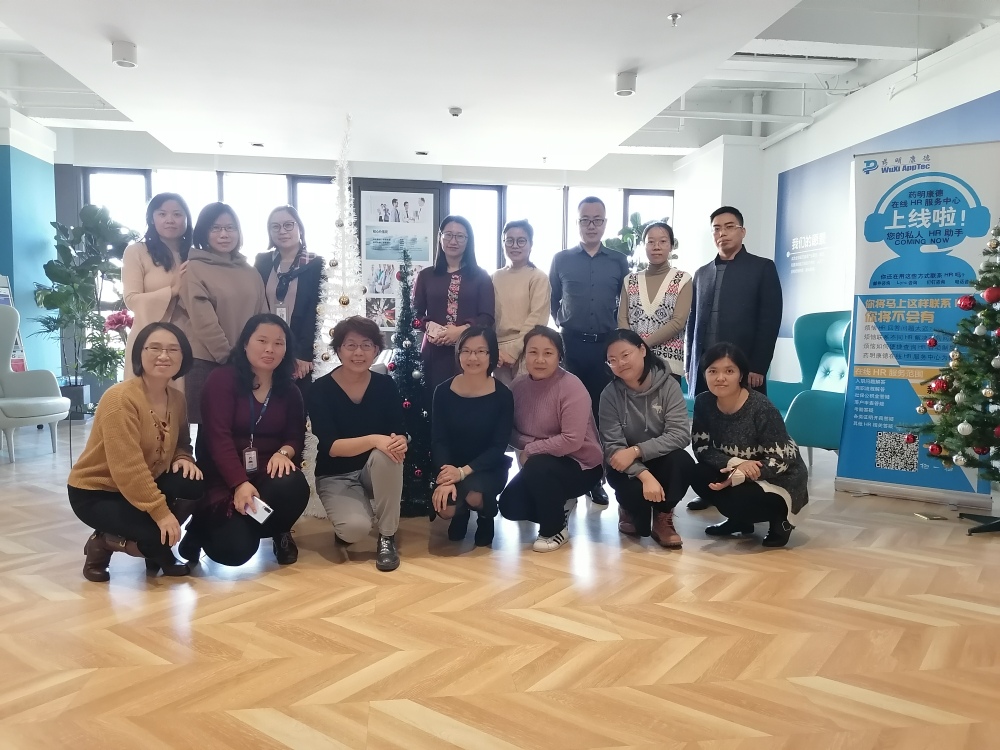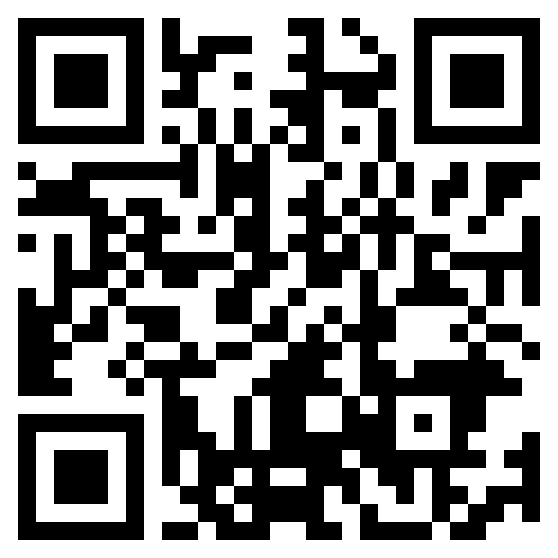The 4th CQAF Quarterly Meeting of 2019 was held in the afternoon of Dec. 17th in the Beijing and Shanghai office of Medkey Med-Tech Development Co. Ltd.. A total of 88 members from around 60 pharmaceutical companies, clinical trial institutions and contract research organizations participated in the face-to-face meeting or online meeting. The conference was hosted by Ms. Hua (Hannah) Chen and focused on recent hot topics in quality management: including China PV regulations implementation changes & PV inspections experiences sharing as well as some sharing about the Quality Management Workshop for Drug Clinical Trial Institutions.
CQAF 2019 年第四季度会于12月17日下午在上海津石医药科技有限公司北京和上海会议室召开。来自约60家医药公司、临床试验机构和合同研究机构的88名成员参加了面对面会议或网络会议。本次会议由陈华女士主持,交流了质量管理领域的最新热点问题,包括:中国药物警戒法规的变化和检查的经验分享,以及近期药物临床试验机构质量管理研讨班的讨论内容。

CQAF 2019 Q4 Meeting, Shanghai

CQAF 2019 Q4 Meeting, Beijing
中国药物警戒法规的变化和中国药物警戒检查的经验分享
Topic 1: China PV regulations implementation changes
Presentation by Dongyuan Wang
The new drug administration law puts forward "National Pharmacovigilance System" -- the scope of pharmacovigilance is boarder than that of drug adverse reaction monitoring, from collecting adverse reactions to including drug interaction, overdose, misuse, abuse, medication error, etc.; from collecting spontaneous reports to spontaneous reports, centralized monitoring, database analysis, clinical study, observational study, etc.; On the basis of adverse reaction monitoring, the new drug administration law focuses on the requirements of safety assessment and risk management. The marketing authorization holder (MAH) shall formulate the post marketing risk management plan (RMP) and take risk minimization measures timely for the important identified risks. The new drug administration law emphasized that MAH is the main body of drug safety, should carry out continuous risk management activities during the whole life cycle of the drug.
In addition, MAH should establish an annual report system to evaluate the production and sale, post marketing study and risk management of the drugs in accordance with the regulations and regularly evaluate the safety, efficacy and quality controllability of the drugs in the market.
Questions were actively raised and discussed regarding drug safety assessment and RMP. WHO-UMC system for standardized case causality assessment and GVP module IX signal management could be referred as a guidance for causality assessment and signal management in pharmacovigilance. No matter whether the RMP is required to be submitted to the regulatory authority as a formal document or not, what the life cycle of the drug is, MAH should continue to carry out drug safety assessment and risk management activities & measures to ensure patients safety.
新的药品管理法提出“国家实行药物警戒制度”--药物警戒比药品不良反应监测的范围更广泛,从收集不良反应增加到包括药物相互作用、过量、误用、滥用、错用等;从收集自发报告为主到自发报告、集中监测、数据库分析、临床研究、观察性研究等多种方法;在不良反应监测的基础上,新药法重点强调了安全性评价和风险管理的要求,药品上市许可持有人应当制定药品上市后风险管理计划,对已识别风险的药品及时采取风险控制措施。强调持有人的药品安全主体责任,并应该对药品全生命周期进行持续的风险管理。
此外药品上市许可持有人应当建立年度报告制度,每年将药品生产销售、上市后研究、风险管理等情况按照规定并应当对已上市药品的安全性、有效性和质量可控性定期开展上市后评价。
大家对于产品安全性评价、风险管理计划等方面踊跃提问和讨论。WHO-UMC标准化相关性评价体系,GVP Module IX信号管理对于药物警戒工作中开展相关性评价和信号管理有指导作用。无论是否要求风险管理计划作为正式文件递交给监管部门,无论药品处于哪一个生命周期,企业都应该持续进行药品安全性评价和风险管控活动与措施,保护患者安全。
Topic 2: China PV inspections experiences sharing
Presentation by Helen Li
Helen shared the feedback/responses from the pre-meeting survey of “PV Inspections in China from 2015 to 2017” , including inspection authority, team composition, inspection location & duration, inspection scope, inspection findings/suggestions, and sponsor inspection management. Attendees from 2 MNCs also shared their experiences within the last 2-3 years.
We have also received some excellent topic/focused area suggestions for PV sub team to work with in the new year.
Helen分享了“2015-2017年中国药物警戒”会前调查的反馈/回复,包括检查机构、团队组成、检查地点和时间、检查范围、检查结果/建议以及申办方检查管理。来自两个跨国公司的与会者也分享了他们过去2-3年的经验。
我们还收到了一些出色的话题/热点领域的建议,药物警戒小组将在新的一年中继续砥砺前行。
The sharing of the 2019 Quality Management Workshop for Drug Clinical Trial Institutions
药物临床试验机构质量管理研讨班分享
Presentation by Hannah Chen
Ms. Hannah Chen reviewed with CQAF members the “Quality Management Workshop for Drug Clinical Trial Institutions” held by the NATIONAL MEDICAL PRODUCTS ADMINISTRATION INSTITUTE OF EXECUTIVE DEVELOPMENT in Beijing on December 14-15, 2019: NMPA Governor made a speech around Promoting the improvement of the level of drug safety and security in China, clarified the requirements of recent regulations, Subsequently, the institution and sponsor representatives jointly published the issues about the current quality management in clinical trial institution.
Ms. Hannah Chen reviewed the problems and experience shared in the quality management in clinical trials institutions in the workshop, including:
² Opportunities and challenges of source data quality in electronic-era: the invited professionals of this workshop shared current practice and their perspectives on the capability of electronic health records (EHR) systems, access rights and the application of information technology to enhance clinical research quality. The construction of EHR system should follow 《Electronic health record application management standard (Trial)》. Though the implementation is varied from hospitals to hospitals, the EHR data is attributable (with audit trials) according to the invited professionals who suggested that the sponsor / CRO confirm it with the Information Department of hospitals during feasibility check/ site selection. Currently, practices in some hospitals, e.g. enhancing system specification requirement (e.g. contemporaneous data entry and backup) and restricted access (e.g. username + password+ unique keycode), help ensure EHR data’s security and reliability. In terms of restricted read-only access to EHR, the participated GCP officer/professionals confirmed read-only access can be granted to an auditor. As for CRA’s read-only access to a particular trial’s subjects, it can be realized technically, but still face administrative/logistic challenges. In order to ensure the safety of EHR data and effective review / verification of the clinical trial source data, the participated professionals agreed on the necessity of granting read-only access for CRAs. In the aspect of information technology supporting quality, Ms. Jiang, the GCP Office director of Beijing Cancer Hospital shared some of their practices at the hospital, such as AI technology capturing laboratory abnormal value / potential adverse events, which applied in a pilot project and significantly reduced the risk of miss-reported AEs. Moving forward, the participating professionals hope to realize EHR data standardization and the interoperability of EHR and EDC systems, which would enhance data consistency and clinical research efficiency.
² Investigator motivation and training: How to motivate investigators to carry out clinical trials has always been an important challenge for Clinical trial institution. Traditional training has little effect on improving the quality of clinical trials. It’s suggested that comprehensive measures need to be taken, such as motivating investigators to conduct clinical trials from the hospital system, embedding the quality of the trials into performance evaluation, and linking with the promotion of professional titles, reasonable allocation and timely payment of labor costs, supplemented by targeted training, etc., so as to maximize the enthusiasm of investigators to conduct clinical trials.
² Investigator's responsibilities: Including the boundaries and management mode of CRC, how the institution can establish effective communication and cooperation with the sponsor on the basis of equality and respect, the representatives of the institutions in the workshop shared the experience of quality management, and how important the clear boundaries, role and responsibilities among the investigators, clinical trial institutions and the sponsors will contribute to the quality of clinical trials. It should be noted that there is no one method suitable for all clinical trial institutions. Therefore, while learning from the experience of others, the institution needs to find out a set of quality management methods suitable for its own hospital situation.
In the end, Ms. Hannah Chen proposed that quality is made, not detected, and it is a consensus that quality management is that we do things right at the first beginning.
陈华女士再现了2019年12月14-15号国家药品监督管理局高研院在北京召开的“药物临床试验机构质量管理研讨班”的情景:药监局领导做了“推动我国药品安全保障水平提升”的演讲,梳理了近期出台的法规要求; 随后机构和申办者代表共同发表了关于目前机构在临床试验质量管理中存在的问题。
陈华女士重点和会员们回顾了研讨班上激励讨论的机构在临床试验质量管理中存在的问题和经验分享,包括:
² E-时代原始数据质量管理的机遇和挑战:这次研讨会特邀嘉宾就电子化病历,登录权限管理和信息化技术的应用助力临床研究质量等热点问题分享了目前的实践和展望。电子病历的建设基本上要遵照《电子病历应用管理规范(试行)》。每家医院的执行情况各有不同,但基本实现记录和更改均可溯(保有稽查痕迹),与会的专家建议申办方/CRO在中心选择时尽量通过机构直接跟相关医院的信息科确认;目前部分医院通过系统的设定,规范实时记录,及时备份,和专号专用(如用户名+密码+密钥)以确保数据的安全,可靠。在只读权限的授权方面,与会专家所在机构基本能为稽查员开放限于研究受试者的只读权限,针对CRC和CRA的权限,技术上能够实现,但大部分机构还存在管理上的挑战。为确保数据的安全和有效的试验原始数据查阅/验证工作,与会专家一致同意为CRA开放只读权限的必要性。在信息化技术助力质量方面,主讲专家(北京肿瘤医院机构办江主任)为大家分享了该院的一些实践,如AI技术抓取试验室异常值/潜在不良事件,该技术已在试点的项目中应用并大大降低了漏报AE的风险。展望未来,与会专家希望通过信息技术实现对EHR数据的结构化,在数据脱敏后,结构化的EHR数据能直接对接eCRF,确保数据的一致性,并提升科研效率。
² 研究者的激励与培训: 如何调动研究者开展临床试验的积极性,一直是机构工作面临的重要挑战,传统培训对提高临床试验的质量收效甚微。研讨班上提出需要采取综合措施,例如从医院制度上激励研究者开展临床试验,将试验的质量纳入绩效考评,并与职称晋升挂钩,合理分配和及时发放劳务费,再辅以有针对性的专题培训等,从而来最大程度的激发研究者开展临床试验的热情。
² 研究者职责: 包括CRC 职责的界限及管理模式,机构如何与申办方建立以平等,尊重基础上的有效沟通和合作,研讨班上机构代表分享了质量管理的经验,临床试验中研究者与机构,与申办者责任边界,及职责清晰对确保临床试验质量的重要性。应该注意的是没有一种方法是适合所有临床试验机构的,因此机构在借鉴他人经验的同时,需要摸索出一套适合自己医院情况的质量管理方法。
最后陈华女士提出,质量是做出来的,不是查出来的,质量管理应该从源头抓起是大家的共识。
-----------------------------------------------------------------------------------------------------
Upcoming CQAF Events
CQAF 10’year anniversary / 2020 Annual Meeting --- May 19, 2020, Suzhou
-----------------------------------------------------------------------------------------------------
We welcome you to join us to propose topics and act as a speaker to share your experience in future quarterly meeting. For submitting your thoughts, please go to the link or QR code below:

关于上述的分享PPT,请登陆会员账户,点击下方第二页。
关于如何注册和登陆会员账户,请参见 CQAF Website User Guide

 沪公网安备 31011202013414号
沪公网安备 31011202013414号